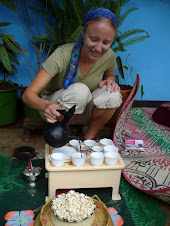Surely, one of the finest ways to see
Traveling northward, I'm sitting in just that favorite seat on the "twelve"-passenger van (currently carrying twenty) as it rambles along the asphalt road. I'm sandwiched between the driver and another young passenger, who wears a canary yellow Sean John t-shirt, wrinkled blue jeans, and thin, well groomed, shoulder-length dreadlocks bundled attractively just behind his ears. The driver balances a glass bottle of Coca-Cola in the storage pocket of the door beside him, and a plastic bag of khat on his lap. He sings along to the Amharic pop music blaring from the stereo and talks animatedly with passengers' reflections in the rearview mirror, as caffeine and amphetamine course in powerful combination through his body.
I have a perfect view of our surroundings as they roll past us. It is a brilliantly sunny day, and recent rains have made the land verdant and fresh. We drive through countryside painted in vivid greens and the rich browns of freshly tilled earth. In nearly every field, farmers are out driving their ox plows, preparing for the fast-approaching growing season. Processions of people make their way alongside the road, bearing goods to and from the market. The Gojjam men are bundled up in woven blankets from the waist up, but they bare their dark, spindly legs in tiny cloth shorts, sometimes stitched all over in beds and buttons. They present a spectacular array of colorful headwear, from various styles of turban-like wrappings to homemade stocking caps sprouting fuzzy yarn tufts all over their surfaces, creating the effect of a psychedelic bunch of broccoli. Each carries a wooden herding stick over his shoulder, to which the occasional live chicken is tethered by its feet. The Gojjam women wear their headwraps and simple cloth dresses, cinched at the waist with white sashes embroidered in neons, sometimes trailing cowry shells dangling from thin leather strands. They carry produce in large wicker baskets and water in fired clay pots, loaded heavily upon their bent backs. Lines of children coming home from school form rivulets of color in their solid-hued uniforms. Some of these trickle out far from their sources, as students from rural areas cover the many kilometers of their twice-daily trek.
The paved road is shared between people, animals, and vehicles, traditional and modern. 4.5-metric-ton white Isuzu transport trucks maneuver around rickety horse carts. Minibuses like ours routinely brake for herds of sheep, goats, and cattle making leisurely crossings. A particularly stubborn sheep in the road brings us to a complete halt from 100 kilometers per hour, and I have to grab onto my dreadlocked seatmate's arm to keep from sliding into the dashboard. Accidents are common on the road in
We pass through shrubby hills dotted with round, thatched-roof huts. We pass over muddy streams, where women wash their families' clothes and lay them out like dazzling banners along the banks to dry. We pass the rusted carcasses of decrepit military tanks, remnants of the toppled military regime left to rot in open fields. We pass through a scattered few towns, which spring up suddenly from the rugged landscape and disappear in a blur of colorful storefronts and NGO logos less than two minutes later. We pass men and boys urinating in the roadside ditches.
At some point along in our journey, the music cassette ceases to play, bringing a rare peaceful silence to the car. The driver ejects the tape and bangs it repeatedly against the steering wheel in an attempt to fix it - surprisingly, to no avail. A female passenger in the row behind me cracks a window in an attempt to relieve the greenhouse heating effect being created inside our vehicle under the intense midday sun. I draw in one delicious breath of cool, fresh air before the driver demands the window be shut; the wind gives him a headache. A new cassette tape is inserted to replace the malfunctioning one. The blaring music resumes.
As our destination comes into sight, the driver refastens the seatbelt he had removed at the start of the trip, once town and traffic police had been safely left behind. He reaches down beside his seat to retrieve the sideview mirror that has come detached from its frame and holds it at arm's length through his window to check traffic behind him.
We pull into the bus station, where all is chatter, bustle, and dust. Swarms of station boys rush to surround the minibus bearing the white farenji in the front seat, eager to offer me another bus, directions, a hotel for the night, help carrying my backpack - all, of course, for a small fee. Suddenly my journey to this place, even with the heat, noise, stubborn farm animals, and chemically-amped driver, seems beautifully idyllic compared to the one that faces me next.

No comments:
Post a Comment